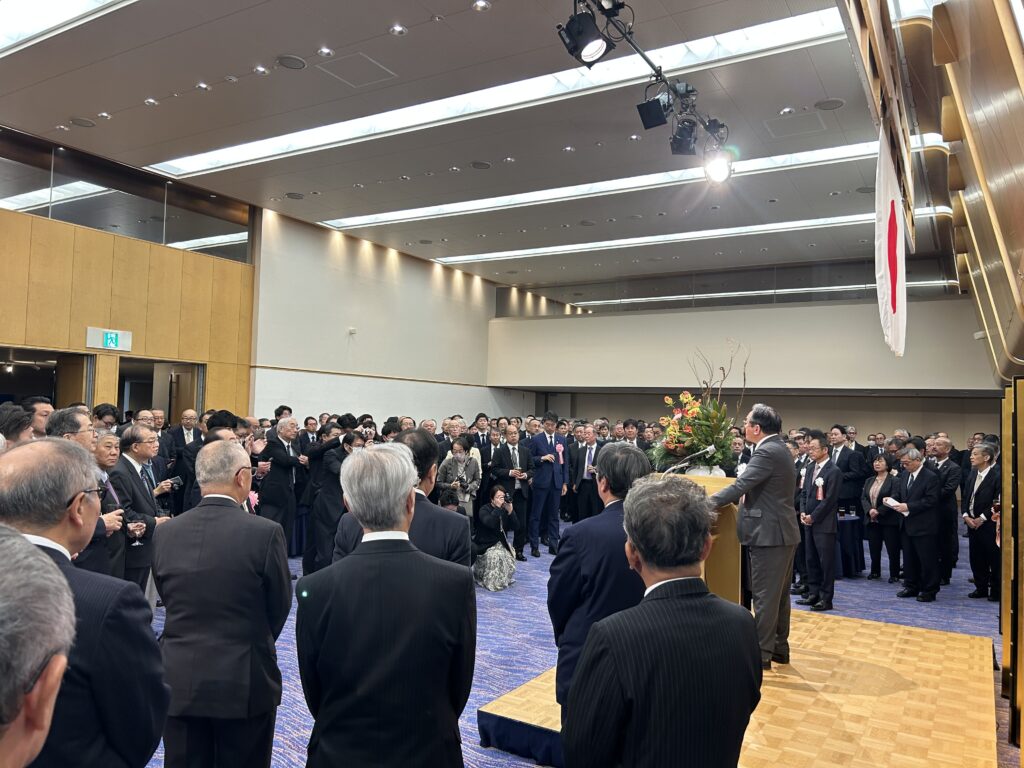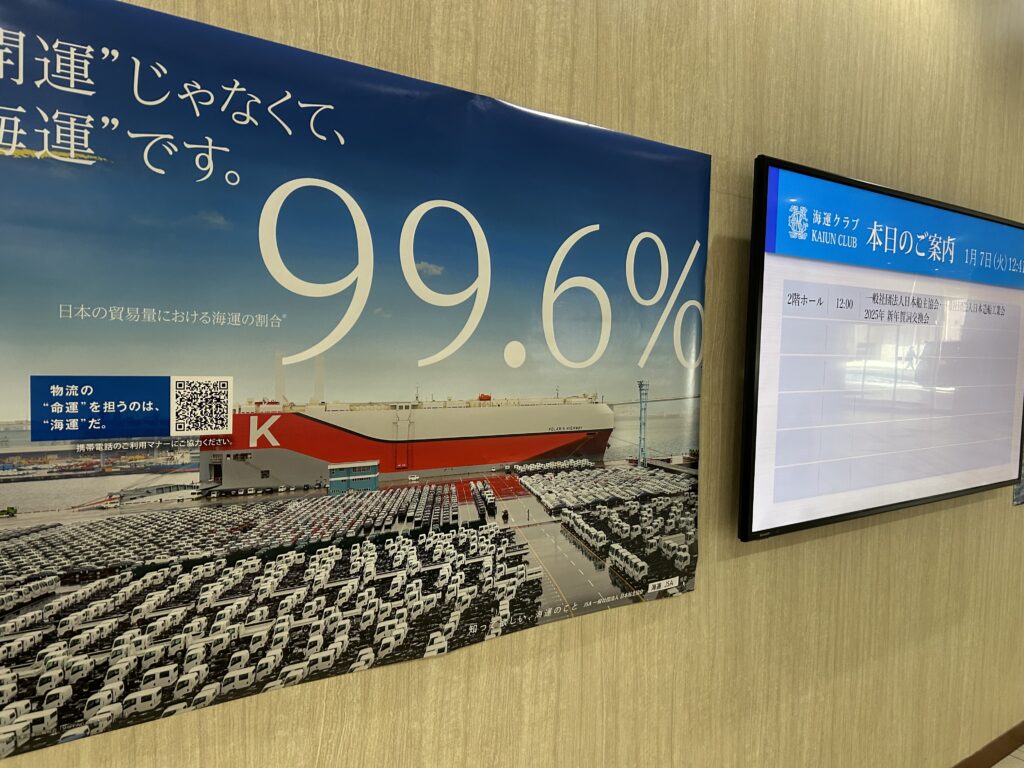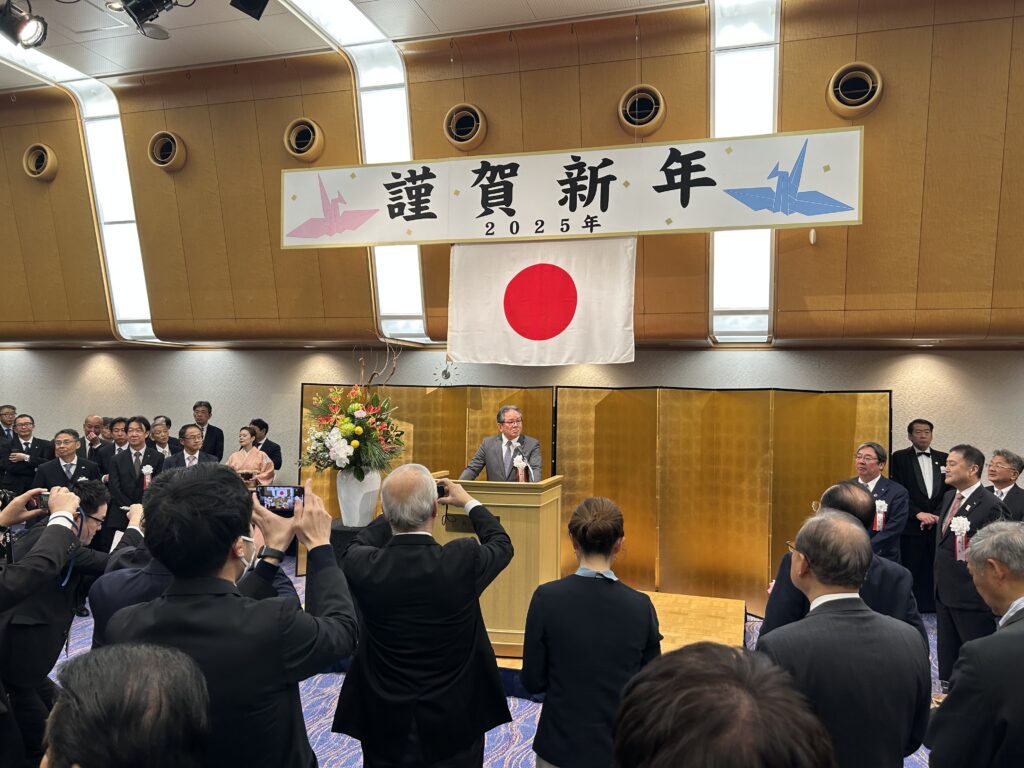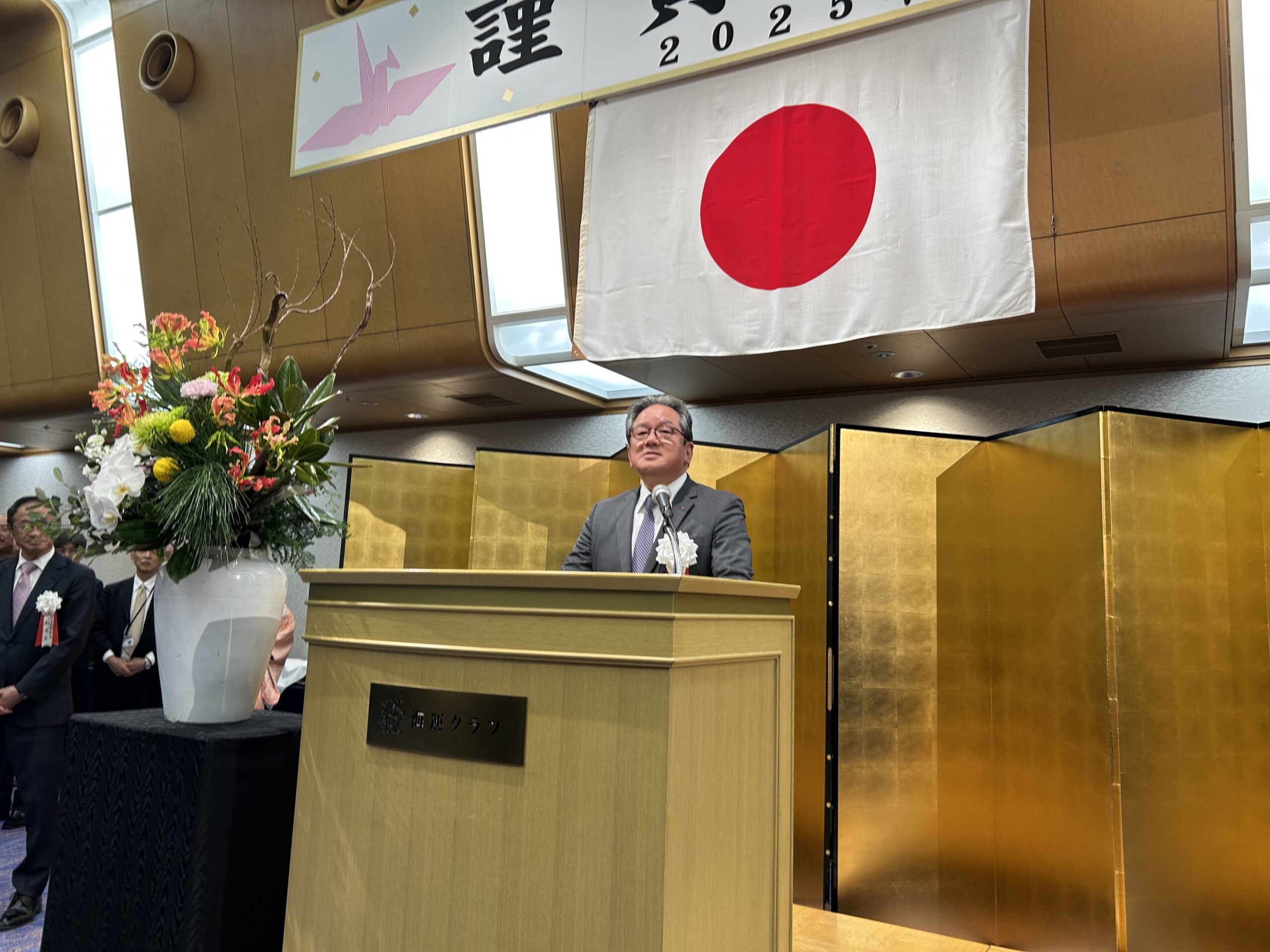The Japanese Shipowners’ Association (JSA) and The Shipbuilders’ Association of Japan (SAJ) held their annual New Year reception on January 7, 2025, at the Kaiun Building in Tokyo’s Hirakawa-cho. The event brought together key stakeholders from the maritime industry, including representatives from the Ministry of Land, Infrastructure, Transport and Tourism, the Ministry of Defence, and the Japan Coast Guard, as well as members of parliament.
(Text by Hirofumi Yamamoto)
Photo courtesy=Hirofumi Yamamoto

In his New Year address, JSA Chairman Yukikazu Myochin outlined the current state of the industry, the challenges it faces, and the association’s plans for the year ahead. He began by reflecting on the past year, noting that the unstable global situation had underscored the importance of the maritime industry.
“Last year saw a renewed recognition of the vital role that shipping plays in maintaining global supply chains,” Myochin stated. He cited the prolonged conflict in Ukraine following Russia’s invasion and the restrictions on passage through the Panama Canal due to drought as examples of how global instability has impacted maritime operations.
Turning to environmental regulations, Myochin highlighted the European Union’s Emissions Trading System (EU ETS) being extended to the shipping sector and the International Maritime Organization’s (IMO) tightening of environmental standards. He described 2024 as a year of significant progress in environmental measures and predicted that 2025 would continue to see challenging geopolitical and trade conditions.

“The shipping industry must unite to address these ongoing issues,” he stressed, pointing to the need for collective efforts across the sector.
A key theme of Myochin’s speech was the assurance of safe vessel operations. He expressed grave concern over the recent surge in attacks on commercial ships since the outbreak of conflict between Israel and Hamas, noting that more than 130 incidents had been reported. Two vessels had been sunk, and four crew members lost their lives. Additionally, Myochin revealed that a ship operated by a JSA member company had been hijacked, with crew members still being held captive over a year later.
“We firmly condemn these heinous acts and continue to call for the swift release of the detained crew and the protection of free and safe navigation,” Myochin declared.
He also touched on the resurgence of piracy incidents in the Gulf of Aden and off the coast of Somalia, emphasising the continued necessity of anti-piracy measures led by the Japan Self-Defense Forces, the Japan Coast Guard, and international partners. He expressed gratitude for these efforts and urged their continuation.
Regarding environmental issues, Myochin noted that the EU ETS had been applied to the maritime sector as of last year and that new regulations on ship fuel usage would take effect in April 2025. He stressed the need for unified international regulations to avoid a fragmented approach, urging the Japanese government to take a leading role in discussions at the IMO.
“Addressing environmental regulations requires the development of new fuels, technologies, and supply infrastructures,” Myochin stated, expressing the industry’s commitment to these advancements.
Myochin also highlighted the importance of securing and nurturing talent within the maritime industry. He stressed the critical role of highly skilled Japanese seafarers in ensuring both safe operations and environmental compliance. Recognising the challenges posed by a declining birth rate and increasing competition for talent from other industries, he called for stronger cooperation among stakeholders to promote human resource development.
In closing, Myochin reaffirmed the association’s dedication to supporting global logistics through the provision of safe and reliable shipping services.
“The Japanese shipping industry will continue to play a key role in supporting global trade. We remain committed to ensuring the safe and stable provision of maritime transport services,” he concluded.

〆日本船主協会(The Japanese Shipowners’ Association、JSA)の明珍幸一(Myochin Yukikazu)会長、「船舶の安全・安定的な輸送サービスの提供に努める」と決意を表明。
日本船主協会と日本造船工業会(The Shipbuilders’ Association of Japan 、SAJ)は2025年1月7日、東京・平河町の海運ビル(Kaiun building)で新年賀詞交換会を開催した。日本船主協会の明珍幸一(Myochin Yukikazu)会長は、新年の挨拶として、業界の現状や課題、今後の取り組みについて述べた。挨拶は国土交通省や防衛省、海上保安庁など関係省庁の担当者や国会議員ら、多数の関係者が集う場で行われた。
明珍会長は、まず昨年を振り返り、「世界情勢の不安定化により、海運業界の重要性が改めて認識された一年だった」と語った。具体的には、ロシアによるウクライナ侵攻の長期化や、パナマ運河の渇水による通行制限など、サプライチェーンの維持が困難になる中で、海運の役割が一層重要視されていると説明した。
また、EU(欧州連合)の排出量取引制度(EU ETS)の海運セクターへの適用開始や、国際海事機関(IMO)における環境規制の強化についても触れ、「環境対応が急速に進んだ年でもあった」と強調。今年は中東情勢や米国の通商政策など、さらに不安定な国際情勢が続くと予測し、海運業界が一致団結してこれらの課題に取り組む必要性を訴えた。
明珍会長は、海運業界にとって最も重要なのは「船舶の安全運航の確保」であると述べた。
イスラエルとパレスチナのハマスとの軍事衝突以降、商船への攻撃が相次ぎ、これまでに130件以上の事案が発生。2隻の船舶が沈没し、4名の船員が犠牲になった事例も報告されている。さらに、日本船主協会の会員企業が運航する船舶がハイジャックされ、1年以上が経過した今も船員が拘束されているという。
明珍会長は、「このような非道な行為を断固非難するとともに、船員の早期解放と、船舶の自由で安全な航行の確保を引き続き求めていく」と力強く述べた。
一方、海賊対策についても言及。ソマリア沖アデン湾周辺での海賊事案が再び増加していることを受け、「自衛隊や海上保安庁、各国による海賊対処行動は引き続き不可欠」と述べ、関係者に感謝の意を示すとともに、活動の継続を強く要請した。
環境問題については、「EUでは昨年、EU ETSが海運セクターに適用され、今年4月からは船舶の使用燃料に関する新たな規制が適用される」と述べた。これにより、地域ごとの規制が進む一方で、「統一的な国際規制の整備が必要であり、日本政府にはIMOでの議論をリードしてほしい」と期待を寄せた。
さらに、環境規制への対応には「新燃料や新技術の開発、供給体制の構築が必要不可欠」とし、業界全体で取り組む意向を示した。海運業界における人材の確保と育成についても触れ、「優秀な日本人船員の存在が、安全運航や環境対応において核となる」と述べた。少子化が進む中、多産業との人材獲得競争が激化する状況を踏まえ、関係者と連携を強化し、人材育成に注力する方針を示した。
明珍会長は最後に、「これからも日本の海運業界が世界の物流を支え続けるため、安全・安定的な輸送サービスの提供に努める」と決意を述べた。
